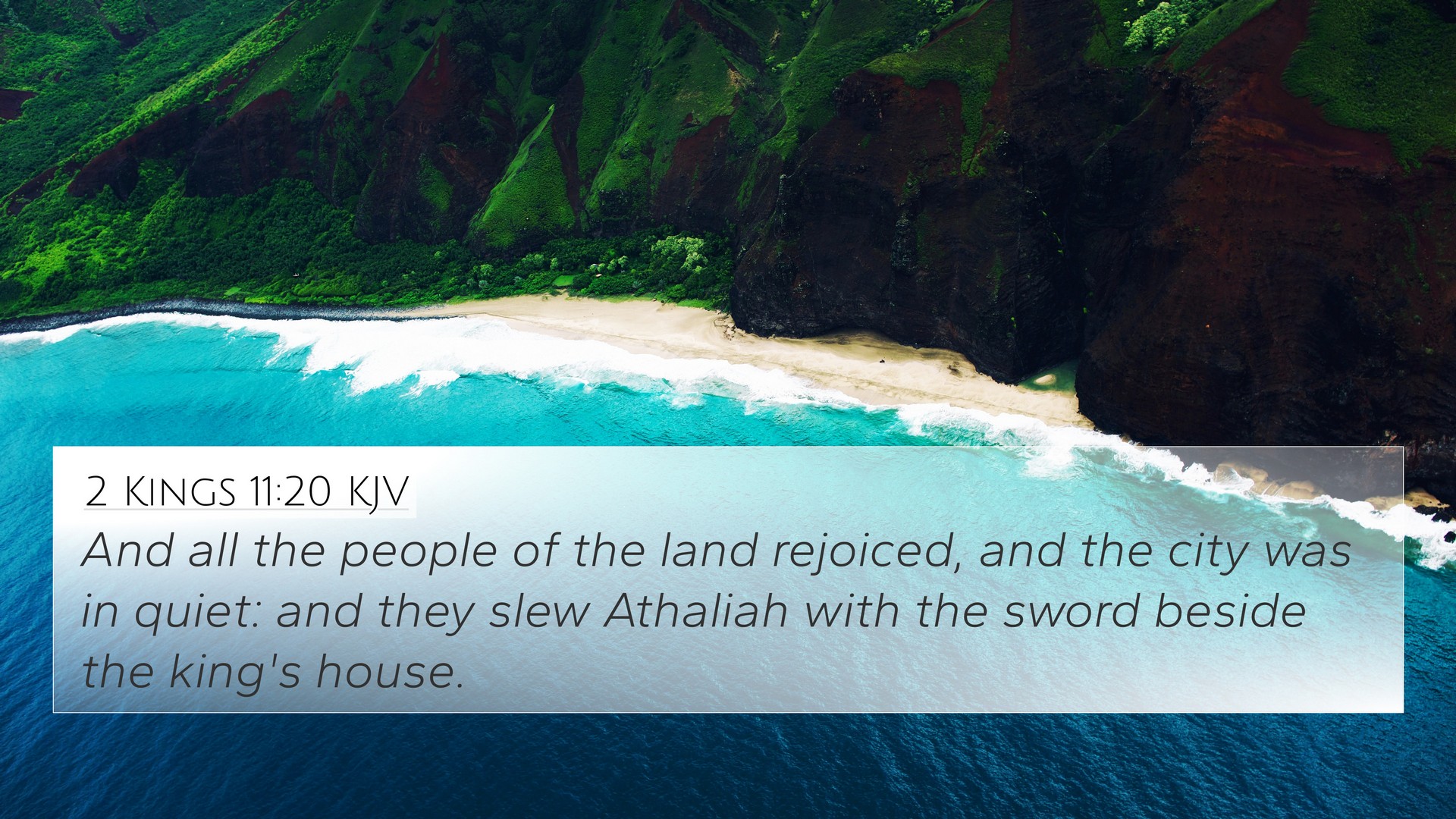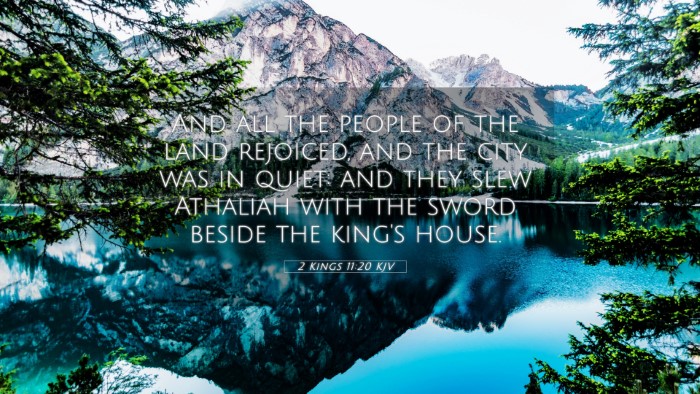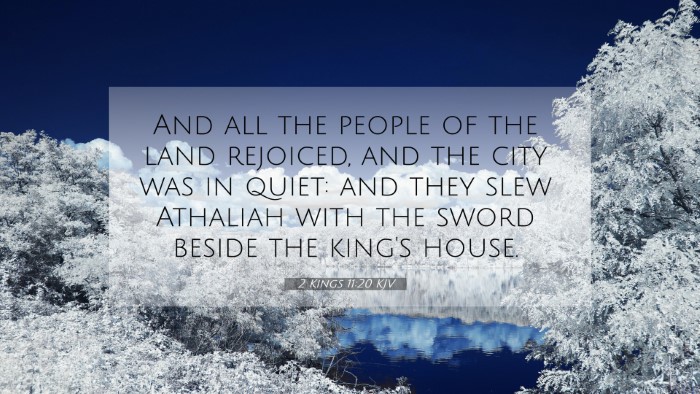Old Testament
Genesis Exodus Leviticus Numbers Deuteronomy Joshua Judges Ruth 1 Samuel 2 Samuel 1 Kings 2 Kings 1 Chronicles 2 Chronicles Ezra Nehemiah Esther Job Psalms Proverbs Ecclesiastes Song of Solomon Isaiah Jeremiah Lamentations Ezekiel Daniel Hosea Joel Amos Obadiah Jonah Micah Nahum Habakkuk Zephaniah Haggai Zechariah Malachi2 Kings 11:20 Similar Verses
2 Kings 11:20 Cross References
And all the people of the land rejoiced, and the city was in quiet: and they slew Athaliah with the sword beside the king's house.
Uncover the Rich Themes and Topics of This Bible Verse
Listed below are the Bible themes associated with 2 Kings 11:20. We invite you to explore each theme to gain deeper insights into the Scriptures.
2 Kings 11:20 Cross Reference Verses
This section features a detailed cross-reference designed to enrich your understanding of the Scriptures. Below, you will find carefully selected verses that echo the themes and teachings related to 2 Kings 11:20 KJV. Click on any image to explore detailed analyses of related Bible verses and uncover deeper theological insights.
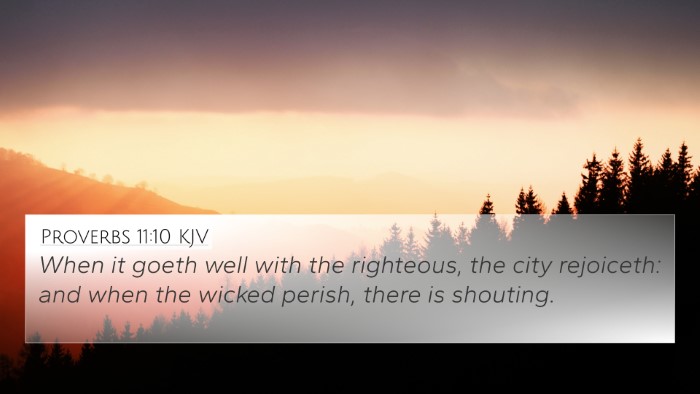
Proverbs 11:10 (KJV) »
When it goeth well with the righteous, the city rejoiceth: and when the wicked perish, there is shouting.
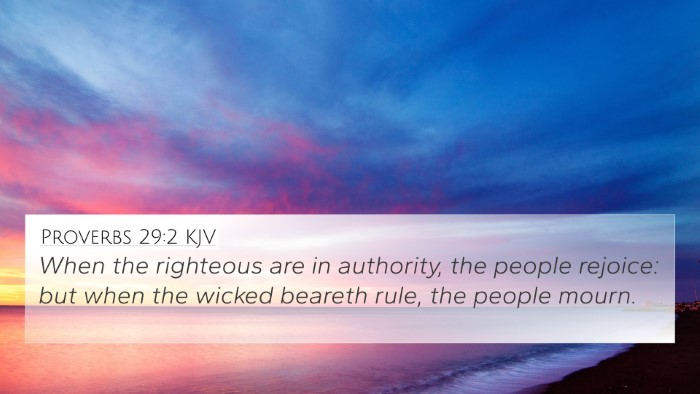
Proverbs 29:2 (KJV) »
When the righteous are in authority, the people rejoice: but when the wicked beareth rule, the people mourn.
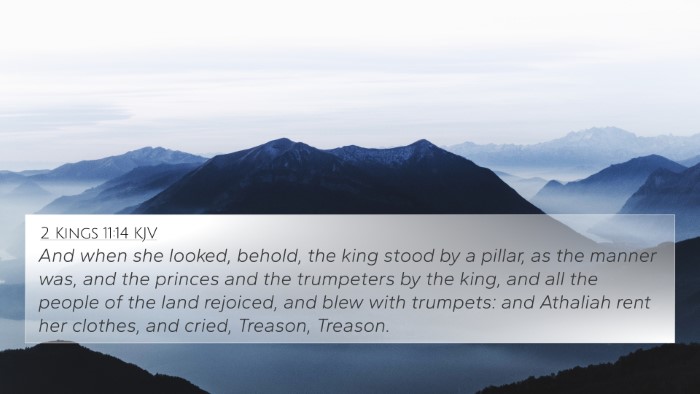
2 Kings 11:14 (KJV) »
And when she looked, behold, the king stood by a pillar, as the manner was, and the princes and the trumpeters by the king, and all the people of the land rejoiced, and blew with trumpets: and Athaliah rent her clothes, and cried, Treason, Treason.
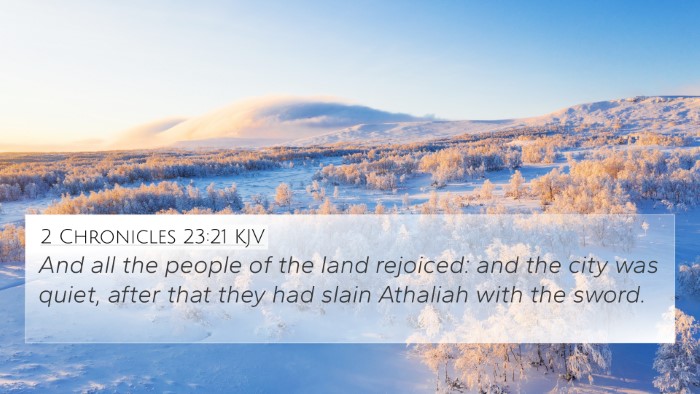
2 Chronicles 23:21 (KJV) »
And all the people of the land rejoiced: and the city was quiet, after that they had slain Athaliah with the sword.
2 Kings 11:20 Verse Analysis and Similar Verses
Understanding 2 Kings 11:20
2 Kings 11:20 captures a pivotal moment in the narrative of Judah's monarchy during a time of crisis and upheaval. In this verse, we observe the aftermath of a coup against Queen Athaliah. This summary merges insights from respected public domain commentaries, intertwining the theological and historical significance of the event.
Contextual Overview: The backdrop of this verse includes Queen Athaliah's tyrannical reign over Judah, marked by her ambition and violence, including the murder of her own children to secure power. Conversely, the rightful heir, Joash (or Jehoash), hidden and preserved from her wrath, emerges as a beacon of hope for the nation's restoration.
Verse Meaning and Interpretation
The verse states, "And all the people of the land rejoiced, and the city was in good quiet; and they slew Athaliah with the sword." This reaction reflects the people's joy at the ousting of a despotic ruler and the restoration of rightful leadership, which is pivotal in the annals of Israel's history.
- Matthew Henry: He emphasizes the transformation from despair to joy following Joash's emergence as king. The people of Judah rejoice not only because of the death of Athaliah but also due to the restoration of their covenant relationship with God, which had been compromised under her rule.
- Albert Barnes: Barnes points out the significance of the public's reaction and the contrast between the reign of Athaliah and the anticipated reign of Joash. He notes that the populace's rejoicing symbolizes a spiritual renewal and hope for the nation.
- Adam Clarke: Clarke discusses the implications of the political shift, suggesting that the festival of rejoicing also served as a means of reinforcing communal bonds and unity, essential for the nation's recovery following a period of oppression.
Thematic Connections
2 Kings 11:20 serves as a critical pivot in the narrative arc of the King's history and has numerous Bible verse cross-references. Here are several significant connections:
- 2 Chronicles 23:21: Reiterates the rejoicing of the people and serves as a parallel account of Joash's ascension.
- 2 Kings 11:1: Describes Athaliah's deadly ambition, providing crucial context for her eventual downfall.
- 1 Samuel 8:5: A reference to the people's desire for a king, demonstrating the issues surrounding leadership and governance in Israel.
- Isaiah 32:1-2: A prophetic promise of a just king, which can be interpreted as a foreshadowing of Joash’s righteous reign.
- Psalms 37:34: Encourages waiting upon the Lord for deliverance, echoing the theme of hope and divine intervention, seen in the preservation of Joash.
- Luke 1:69-70: Connects the themes of salvation and deliverance, linked to God's providence throughout the Biblical narrative.
- John 10:10: Draws a parallel with themes of life and destruction, contrasting Athaliah’s reign with the life-giving leadership promised by God.
Cross-referencing Biblical Texts
Understanding the connections between Bible verses requires tools and methods for effective study. Here are a few recommendations:
- Bible Concordance: Helps locate particular verses and themes efficiently.
- Bible Cross-reference Guide: Offers insights into related verses and supports deeper thematic studies.
- Cros-Reference Bible Study: Engage in methods that connect scriptures with thematic parallels.
- Inter-Biblical Dialogue: Encourages exploring relationships between texts across the Old and New Testaments.
Conclusion
The events surrounding 2 Kings 11:20 provide profound insights into leadership, divine providence, and the cyclical nature of hope and despair in Israel's history. By employing cross-referencing Bible study methods, one can delve into the rich tapestry of scripture that informs this narrative, revealing connections across different books that provide a fuller understanding of God's overarching plan for His people.
